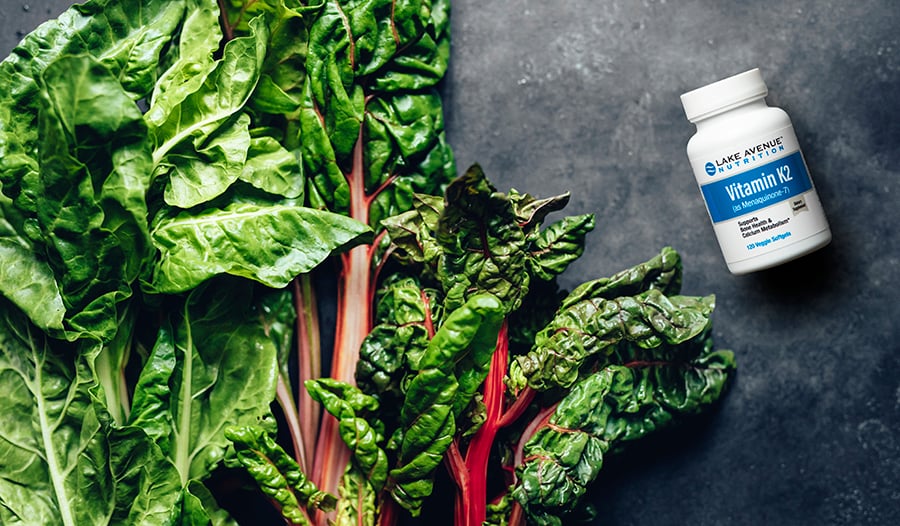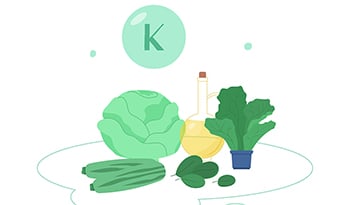Vitamin K Is Trending—Here’s Why It’s Important for Health
DISCLAIMER:This blog does not intend to provide diagnosis...
- In this article:
- What Does Vitamin K’s Do in the Body?
- Are There Different Types of Vitamin K?
- Food Sources of Vitamin K
- Tips for Getting More Vitamin K from Your Diet
- Supplementing Dietary Vitamin K
- Vitamin K Creams
- Summary

It seems that everyone is looking for ways to build bone naturally, improve heart health, and heal bruises more quickly with vitamin K—and it makes sense! Vitamin K is an important nutrient that has powerful effects body-wide. In this article, we’ll talk about how you can use the science around vitamin K to amplify your health safely and naturally.
What Does Vitamin K’s Do in the Body?
Vitamin K is a fat-soluble vitamin that is required to create three important proteins in the body. These vitamin-K-dependent proteins help us:
- Build strong bones by regulating osteocalcin
- Protect blood vessels by inhibiting the calcification of plaque
- Form blood clots after injuries by promoting the production of prothrombin. Vitamin K is so important for the process of blood coagulation, in fact, that it’s actually named after the German word for coagulation (“K” for “koagulation”).
So, if you want to prevent osteoporosis, optimize heart health, and heal from injuries long-term, you can see why vitamin K intake needs to be a critical part of your plan!
Are There Different Types of Vitamin K?
There are two different types of vitamin K, including K1 (phylloquinone) and the K2 family (menaquinones, also known as the MKs, like MK-4, MK-7, MK-9). If you’re feeling overwhelmed by the number of names vitamin K has, just remember that the terms “K2” and “MK” are interchangeable, so it really boils down to just two forms: K1 and K2 (MK).
Food Sources of Vitamin K
K1 is found in green leafy vegetables, while almost all forms of K2 are produced by probiotics/good bacteria in the human colon. K2 can also be found in small amounts in animal products like animal liver and dairy. Adult humans require between 90-120 micrograms of vitamin K each day to stay healthy. If you’re looking to use food as your medicine, here’s a list of the top foods that contain vitamin K.
Top Food Sources of Vitamin K
- Natto (fermented soy): 850mcg MK-7 per 3 ounces
- Collard greens: 530mcg per 1/2 cup
- Turnip greens: 426mcg per 1/2 cup
- Spinach: 145mcg per cup (raw)
- Kale: 113mcg per cup (raw)
- Broccoli: 110mcg per 1/2 cup (cooked)
- Carrot juice: 28mcg per 3/4 cup
- Edamame: 21mcg per 1/2 cup
- Pumpkin 20 mcg per 1/2 cup canned
- Meats (K2) 6mcg per 3 ounces
Tips for Getting More Vitamin K from Your Diet
Because vitamin K is a fat-soluble vitamin, you’re more likely to absorb it if you eat it as part of a fat-containing meal or snack. To apply this to your day-to-day diet, top greens with an oil-based dressing or include some nuts and seeds along with your broccoli and carrot snack.
An even easier way to add more vitamin K-rich foods to your diet is to use a dark leafy greens powder in your morning smoothie protein mix, baked goods mix, or oatmeal. You can also munch on edamame or kale chips if you’re on the go. Stir-frying greens along with your meat to make a plant and protein-rich lunch or dinner is another easy, healthy way to add more vitamin K.
Supplementing Dietary Vitamin K
Vitamin K1 deficiency is rare in people eating a healthful diet. K2 deficiencies are also rare because humans produce vitamin K endogenously via colonic bacterial metabolism if they have the right probiotics. If someone has a long history of a malabsorptive disorder, celiac disease, IBD, cystic fibrosis, chronic antibiotic or bile sequestrant use, or has symptoms of vitamin K deficiency (bleeding and clotting issues), I will consider having them supplement vitamin K with a vitamin K pill or vitamin K powder form of this nutrient until we heal the root cause of their deficiency.
When choosing a vitamin K supplement, I always advise my clients to consider a full-spectrum vitamin K product that contains bioavailable forms of menaquinones, particularly MK-7. If you know that you get enough leafy greens each day in your diet and aren’t in need of more K1, then you can choose a K2-only supplement.
It’s arguable that the easiest way to supplement vitamin K is to take a multivitamin that’s made with vitamin K or a bone health supplement that contains K2. Many calcium supplements now contain vitamin K to help build bone matrix, so you can combine your nutrients into one pill more easily. Check labels before you buy and always check with your doctor before purchasing an oral vitamin K supplement. Supplemental vitamin K can interact with Warfarin/Coumadin and may change the blood concentrations of blood-clotting medications, which can lead to serious side effects.
Vitamin K Creams
New studies have shown that vitamin K creams can be used to prevent or minimize the appearance of bruising. Many have extrapolated that this may mean that vitamin K creams can help to conceal under-eye circles as well since these circles result from fluid leakage from blood vessels (similar to a bruise). To use vitamin K cream, apply it morning and night under the eyes and wait 4-6 weeks to see if it helps to reduce the appearance of circles. If you want to kick up your under-eye routine to ultra-healthy levels, consider an antioxidant vitamin K cream that’s also made with fruit extracts or vulnerary herbs like aloe.
Special note: I always recommend you follow your OBGYN’s recommendations regarding vitamin K supplementation in newborns to prevent VKDB (vitamin K deficiency bleeding/classic hemorrhagic disease of the newborn). Since vitamin K is not well-absorbed across the placenta and breast milk tends to be low in vitamin K, many infants (particularly breastfed infants) are at risk of developing bleeding disorders that can be fatal unless they’re supplemented with vitamin K in their first few weeks of life. The best way to administer this vitamin K to infants is with a specific dose injected into a muscle one time. Follow your pediatrician or OB’s advice on this and give your baby this potentially life-saving vitamin early.
Summary
As you can see, vitamin K is incredibly important for bone health, blood health, and cardiovascular function. It’s easy and fun to get from foods and there are wonderful supplements that can help you reach your RDI for this nutrient as well.
References:
- “FoodData Central.” Usda.gov, 2021, fdc.nal.usda.gov/fdc-app.html#/?component=1183. Accessed 16 July 2021.
- “Office of Dietary Supplements - Vitamin K.” Nih.gov, 2017, ods.od.nih.gov/factsheets/VitaminK-HealthProfessional/. Accessed 15 July 2021.
- Vitamin K. “Vitamin K.” Linus Pauling Institute, 22 Apr. 2014, lpi.oregonstate.edu/mic/vitamins/vitamin-K. Accessed 16 July 2021.

 By Dr. Kate Henry, N.D.
By Dr. Kate Henry, N.D.


